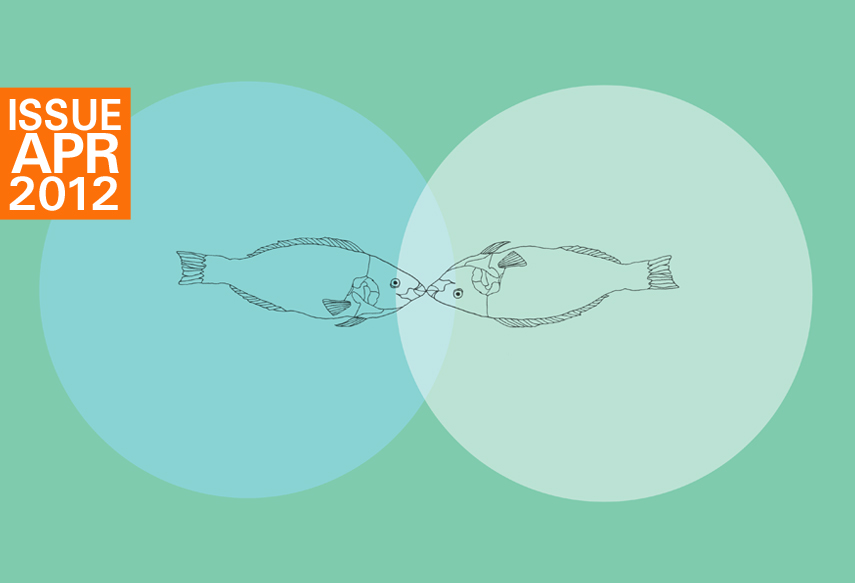- Featuring
- Josef Winkler
- Etgar Keret Flávio de Araújo
- Marek Bienczyk
- Taiwanese Erasurist Poetry
- Nadifa Mohamed on Somali Writers
A mouth about to open. An email draft deleted. Much of what we love about writing isn't actually written on the page. This new issue of Asymptote, then, deals with our usual mysteries of translation, as well as the blessings and sins of omission.
Our special feature presents our yearly foray into original English-language fiction in the form of eight stories addressing 'the unsaid'. In the short story that inspired this theme, David Leavitt's Route 80, a relationship fails despite a last-minute attempt at horticulture. In other tales of heartbreak, there's more than meets the eye to real estate (Brittani Sonnenberg's 1116 Arcadia Ave.), a Paris subway ride (Rosa Rankin-Gee's Métro), and an ex-turned-goldfish (Anthony Luebbert's Rainbow Fish).
Leading off the translated work this issue is a new short fiction from beloved Israeli story-teller, Etgar Keret, about a young woman mourning a man and the fact that she never said she loved him. Via new contributing editors Howard Goldblatt and Sylvia Lin (welcome!), we present our very first work from Tibet in Alai's retelling of the Tibetan "King Gesar" epic. Then there is Josef Winkler, an intense writer as celebrated in Austria as Jelinek and Bernhard but remains obscure outside the German-speaking world—something we hope to remedy through Adrian West's superb translation as well as his introduction in the Writers on Writers section (which, btw, also features a wonderful survey on Somali literature and a fab experimental piece by Lennox Raphael). From the Japanese, meanwhile, there's an embarrassment of riches in the form of a luminescent memoir by Takahashi Mutsuo, a new play by Masataka Matsuda, and a disturbingly comic short story by Taiwanese writer Kou Reishi.
Erasurist poetry—created by crossing out words and lines in an existing text—isolates a poem lying dormant and unsaid in a brochure or newspaper, and our gallery of images from the Taiwanese journal Xianzai Shi (Poetry Now) and interview with its candid creators reveal just how much meaning can be wrought from ravaging unsuspecting phrases. The poetry section proper, meanwhile, reveals our first works translated from the Faroese, the Danish, and perhaps even more thrillingly, the K'iche'—the Mayan language used to write the Popul Vuh. Playing off the kissing fish gracing our cover, there's Portugese poetry by Flávio de Araújo alongside harder-edged KGB Poems by Igor Pomerantsev.
A theme that slipped into our issue without premeditation is transparency. Not only is that concept the subject of a fascinating book by Polish writer Marek Bieńczyk (excerpted in this issue), it also characterizes the work of our illustrator, Australia-based Hugo Muecke. His precise lines lend this issue an elegant transparency especially suitable for springtime (at least for the readers in the Northern hemisphere; in Sydney, all is rainy and autumnal, we hear).
Now whether you're sweeping blossom petals or golden leaves off your windowsill or front steps, know that we at Asymptote are excited about this our sixth issue, one we hope will cure both your spring fevers and the drippier ailments associated with the end of Summer. As you enjoy this issue, we hope you will click around the website to explore translator's notes and audio recordings. Do send us a message (or a little donation) if our issue so moves you. The new call for Special Feature submissions for the October Issue—for original English-language poetry exploring the idea of foreignness—is now up at our newly revised Submit page.
Finally, we'd like to sound off with a piece of exciting news: the adventurous Dalkey Archive has appointed our editor-in-chief as the editor of its Best Asian Fiction anthology, modeled after the European counterpart edited by Aleksandar Hemon. If all goes well with fund-raising (any leads from readers would be most welcome, as would any pledges to help make it happen), we should see an inaugural Best Asian Fiction 2014, allowing the hitherto unsaid from many Asian countries to be said (in English). Cross your fingers!
—Lee Yew Leong, Editor-in-Chief
Editorial Team for Issue Apr 2012
Editor-in-Chief:
Lee Yew Leong (Taiwan/Singapore)
Managing Editor:
Florian Duijsens (Holland/Germany)
Section Editors:
Lee Yew Leong (Taiwan/Singapore)
Aditi Machado (India/USA)
Florian Duijsens (Holland/Germany)
Caridad Svich (USA/UK)
Nazry Bahrawi (Singapore/UK)
Contributing Editors:
Howard Goldblatt (USA), Aamer Hussein (Pakistan/UK), Sylvia Lin (Taiwan/USA), Anthony Luebbert (USA), Sayuri Okamoto (Japan/Italy) and Sim Yee Chiang (Singapore)
Grants Officer/Assistant Editor:
Francesca Spedalieri (Italy/USA)
Masthead for Issue Apr 2012
Fiction/Nonfiction/Visual/Feature: Lee Yew Leong
Poetry: Aditi Machado
Drama: Caridad Svich
Criticism: Florian Duijsens
Interview: Nazry Bahrawi
Photo Illustrations and Cover: Hugo Muecke
Guest Artist Liaison: Florian Duijsens
Design: Lee Yew Leong and fFurious
Legal Counsel: Lindy Poh
Tumblr Assistant: Halle Murcek
Asymptote would like to acknowledge the support and/or contributions of: Balkenende Chew & Chia (Advocates & Solicitors), Stacey Knecht, Chia-En Jao, Guo Bingxiu, Darryl Sterk, Gray Tan, Ziv Lewis, Alex Kok, Michelle Loh, Wee Shu Ting, Sara Noor, Gael Bomblain, Judith Huang, Jason Brooks, Rebecca Dolgoy, Leopold Lippert, Agata Lisiak, Shu Okamoto, Prof. Okazaki Ikuko, Richard Deming, Clare Wigfall, SAND Journal, 鯨向海, 呂定遠, Nick Kaldis, Patrizia van Daalen, Danny Lawless, Erica Mena, Steve Bradbury, Meredith Steinbach, and Jeffrey Waxman.

